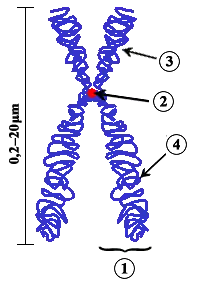chromosome
English

An illustration of chromosome, with its parts. (1) Chromatid. One of the two identical parts of the chromosome after S phase. (2) Centromere. The point where the two chromatids touch, and where the microtubules attach. (3) Short arm (4) Long arm.
Etymology
19th century: from German Chromosom, ultimately from Ancient Greek χρῶμα (khrôma, “colour”) + σῶμα (sôma, “body”) (because they are stained under the microscope). Equivalent to chromo- + -some.
Pronunciation
Noun
chromosome (plural chromosomes)
- (cytology, genetics) A linear arrangement of condensed DNA and associated proteins (such as chaperone proteins) which contains the genetic material (genome) of an organism.
- Chromosomes store genetic information.
- 2019, Bill Bryson, The Body: A Guide for Occupants, Black Swan (2020), page 7:
- A length of DNA is divided into segments called chromosomes and shorter individual units called genes.
Derived terms
- B chromosome
- chromosomal
- chromosome conformation capture
- chromosomed
- chromosome number
- chromosomic
- chromosomology
- diplochromosome
- euchromosome
- genome
- heterochromosome
- idiochromosome
- interchromosome
- intrachromosome
- isochromosome
- lampbrush chromosome
- macrochromosome
- microchromosome
- midchromosome
- minichromosome
- monochromosome
- multichromosome
- nanochromosome
- neochromosome
- Ph chromosome
- Philadelphia chromosome
- pseudochromosome
- ring chromosome
- sex chromosome
- W chromosome
- X chromosome
- Y chromosome
- Z chromosome
Translations
structure in the cell nucleus
|
Further reading
- “chromosome”, in Webster’s Revised Unabridged Dictionary, Springfield, Mass.: G. & C. Merriam, 1913, →OCLC.
- “chromosome”, in The Century Dictionary […], New York, N.Y.: The Century Co., 1911, →OCLC.
- “chromosome”, in OneLook Dictionary Search.
French
Etymology
19th century: chromo- + -some, from German Chromosom, ultimately from Ancient Greek χρῶμα (khrôma, “colour”) + σῶμα (sôma, “body”) (because they are stained under the microscope).
Pronunciation
- IPA(key): /kʁɔ.mo.zom/
Audio (file) - Homophone: chromosomes
- Hyphenation: chro‧mo‧some
Meronyms
Holonyms
Derived terms
Further reading
- “chromosome”, in Trésor de la langue française informatisé [Digitized Treasury of the French Language], 2012.
This article is issued from Wiktionary. The text is licensed under Creative Commons - Attribution - Sharealike. Additional terms may apply for the media files.